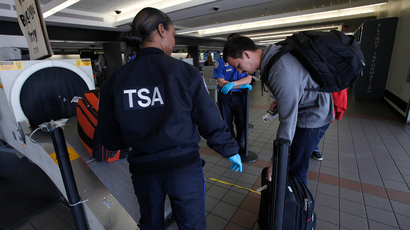Colorado opens first legal US pot shops
The US State of Colorado has entered the New Year on a high note by becoming the first state to legally sell marijuana and open the retail spots for pot. Washington is set to follow suit and open its own recreational shops later in 2014.
At the start of New Year day, at 8 am local time, pot lovers from across the state lined up to be one of the first residents to legally participate in a $578 million market. Some people had been waiting since 1 am.
"I wanted to be one of the first to buy pot and no longer be prosecuted for it. This end of prohibition is long overdue," said Jesse Phillips, cannabis enthusiast from Colorado.
State residents can now legally indulge themselves with up to an ounce of marijuana from more than 30 shops that have opened their doors statewide. Residents from other states can buy up to one-quarter of an ounce.
However, weed enthusiasts can increase their daily limit by shop hopping and purchasing legally allocated amounts from different vendors. Legally under state law, buyers are only allowed to possess up to one ounce of the plant on them.

The state’s prognosis is to sell $578 million worth of marijuana products and generate some $67 million in tax, with $27.5 million designated for school construction.
"I feel good about it. The money's going to schools," Joseph Torres from Denver said while waiting in line.
Overall, about 130 stores received licenses to sell the drug last month, with 200 more getting approval from the state’s Marijuana Enforcement Division. Running the industry will come with a 25% state tax on top of the usual sales tax of 2.9%.
"Things have really been going well," Ashley Kilroy, Denver's executive director of marijuana policy, said at a news conference Wednesday after first sales. "We really haven't seen a negative impact."
"Voters have spoken. We have to implement the laws," Kilroy said.
Cultivation, possession, and personal use of marijuana have already been legal in Colorado under a state constitutional since 2012. But come 2014, cannabis sales will now contribute toward financing the state, where it now can be produced, sold and taxed.
"I'm going to frame the receipt when I go home, to remind myself of what might be possible: Legal everywhere," musician James Aaron Ramsey said in Colorado.
As soon as stores started selling, the Denver police department tweeted, "Do you know the law?" posting a link to websites on state and local legislation.
Do you know the law? http://t.co/ro7XsbyMTM Go to http://t.co/4oOHDswWOv to learn more.
— Denver Police Dept (@DenverPolice) January 1, 2014
Whether or not Colorado’s historic step will be prosecuted by the Federal government remains to be seen, as cannabis is still illegal on the federal level. But shop owners hope that a memo to federal prosecutors issued by the Department of Justice in August saying they should not pursue prosecution for recreational marijuana will prevent them from Drug Enforcement Administration (DEA) and FBI raids.
Opponents of legalizing the recreational use of cannabis warned that sales will increase consumption by minors and create more drug addicts.
"This is a battle that if we catch it early enough we can prevent some of the most egregious adverse impacts that have happened as a result of the commercialized market that promotes alcohol use to young people," former US Representative Patrick Kennedy, co-founder of Project Smart Approaches to Marijuana, told Reuters.
"This is just throwing gas on the fire," Ben Cort of the Colorado Center for Dependency, Addiction & Rehabilitation at the University of Colorado Hospital told AP.
All in all, Colorado has two sets of policies when it comes to weed, those for medicinal use and for recreational use.
In 2012, Colorado passed Amendment 64 allowing adults to grow up to three immature and three mature plants privately and legally possess all cannabis from the plants’ harvest. Residents are allowed to carry up to one ounce of cannabis and give the same amount to other adults.
In 2000, Colorado voters approved Amendment 20 to the State Constitution which allows the use of cannabis for approved patients with doctor’s consent. Under this amendment, patients may possess up to 2 ounces of medicinal marijuana and may cultivate no more than six cannabis plants.
The State of Washington which also voted in November 2012 to legalize cannabis is set to open marijuana retail shops later in 2014. Nearly 20 states, including Colorado and Washington, are already battling the federal government by approving marijuana for medical purposes.














